World water day 2014: Why does energy outperform water?
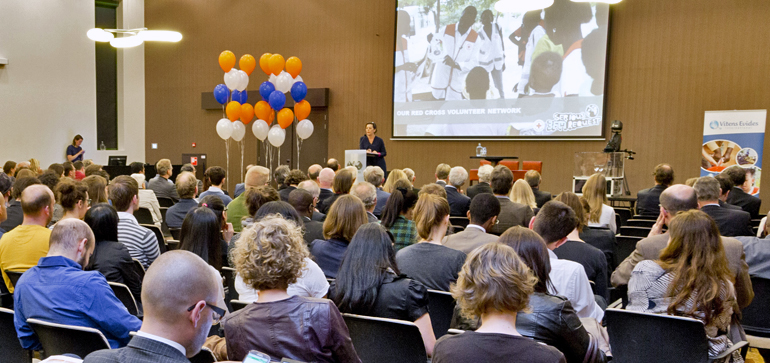 Clean drinking water and good sanitation are public goods, so is energy. How is it possible that in low-income regions the energy supply has become a booming business whereas the water supply keeps struggling? What can the water sector learn from the energy sector when it comes down to doing business in developing countries?
Clean drinking water and good sanitation are public goods, so is energy. How is it possible that in low-income regions the energy supply has become a booming business whereas the water supply keeps struggling? What can the water sector learn from the energy sector when it comes down to doing business in developing countries?
This was the central question debated during the national celebration of World water day 2014 in the Netherlands.
The celebration took place in Leeuwarden and was hosted by the Water Campus Leeuwarden.
Energy supply is booming business
The organizers of the national celebration, WaterCampus Leeuwarden (Wetsus, CEW, Water Alliance), Vitens Evides International, Aqua for All and the Netherlands Water Partnership, programmed a debate around the affordability of public goods.
The classic aid money from Western industrialized countries is drying up and new financing is needed to be able to meet the goal of universal access to clean drinking water and good sanitation. One way is to look at water supply as a normal commodity, comparable to energy.
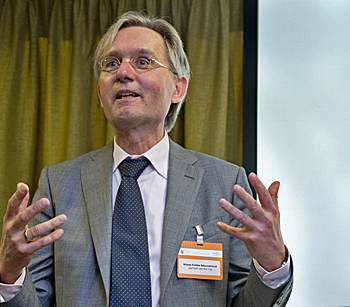 Different tariff policies
Different tariff policies
"Why can energy suppliers increase their tariffs when the oil prices go up, and the water supply companies cannot?", was the question posed by director Gerhard van den Top of Vitens-Evides International (VEI - on photo right)). His company deploys Dutch experts - based on multiple year Water Operator Partnerships (WOPs) arrangements - to assist water companies in developing countries.
It bothers Van den Top to see that national tariff policies hinders water supply companies to develop a financially sound business. "The energy business is financially less restricted and is in general allowed to bill all their costs. This enables energy supply companies to pay back their investments and this makes them less dependable", said Van den Top.
He warned that the water sector legs behind when it comes to cost recovery and he fears the growing gap between the water utilities and the energy utilities may can never be closed again.
Less bankable
As most water utilities are public owned and their tariffs subject to price policies, this makes them less bankable. "Nobody wants to invest in a company that delivers water of which 50 percent is unpaid for and investments cannot be paid back. The financial performance of many public water utilities is poor", stated Van den Top. He considers full cost recovery as a crucial financial element to get universal access to clean drinking water for all people.
VEI director Van den Top: "The supply has to be sustainable so in the end all costs have to be paid for. As an example I can mention the Da Nang Water Company in Vietnam that worked hard on it financial management. It achieved full costs recovery and is now a sustainable business."
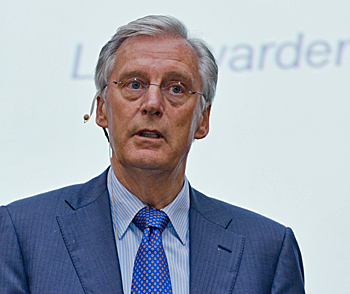 Blending financial options
Blending financial options
Key note speaker Ben Knapen of the European Investment Bank (EIB - on photo left) confirmed the importance of full costs recovery for water supply companies.
"Bankability is key", he said at the Dutch celebration of World Water Day. "We lend money for water projects under two important conditions: the polluter pays and full cost recovery".
Knapen explained that the European Investment Bank (EIB ) is owned by the 28 EU member states, and that the bank wants its money back in the end. He realized that for water supply companies in developing countries it can be difficult to charge its clients the full costs. He suggested the idea of blending loans and subsidies.
Loan and donation
"The financing of water projects is considered very black or white. Either you go to a commercial investment bank for a loan or you try to get a donation from a government." Knapen suggested to look at the potential of a mix. "In the transition from development aid to a commercial investment, the option to blend both options can be interesting. There are many subsidies for studies or technical assistance. It is also possible to blend the financing with risk sharing instruments", he hinted.
Walking for water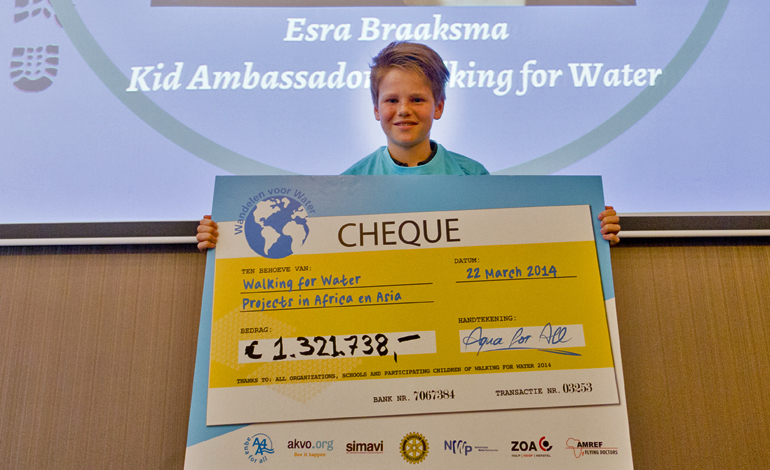 A record number of 33,000 Dutch children in groups 7 and 8 of 570 primary schools participated in the fundraising event Walking for Water. The children walked 6 km with 6 liters of water in a backpack, like many of their peers in developing countries who have to walk this distance to get their daily water.
A record number of 33,000 Dutch children in groups 7 and 8 of 570 primary schools participated in the fundraising event Walking for Water. The children walked 6 km with 6 liters of water in a backpack, like many of their peers in developing countries who have to walk this distance to get their daily water.
At the national celebration of World Water Day kids ambassador Esra Braaksma announced that a total of 1,321,738 euro had been raised. The money will be spent on water projects in Africa and Asia.
Water bridge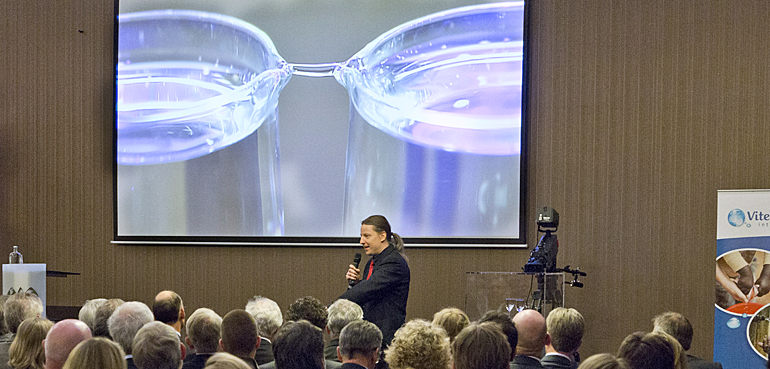 The Water Campus Leeuwarden is the hub of Dutch water treatment technology. To show the abilities of the innovative research, the fascinating experiment with the water bridge was also on the programme.
The Water Campus Leeuwarden is the hub of Dutch water treatment technology. To show the abilities of the innovative research, the fascinating experiment with the water bridge was also on the programme.
Elmar Fuchs of Wetsus showed this experiment of two beakers filled with triply deionized water. When exposed to a high voltage by putting electrodes into the beakers, water forms a stable, cylindrical bridge between two beakers. (please do not try this at home)
Global celebration in Tokyo
The comparison between water utilities and energy utilities linked up with this years’ theme World Water Day: water and energy.
The global celebration took place in Tokyo and there the discussion focused on the water shortages that will increase sharply if the energy sector starts producing 70% more electricity in the coming decades. New power stations in arid regions will create even more water stress. The water sector challenges the energy sector to make a joint effort to ensure that the electricity production can go up without increasing the water demand.
(photos: Bart Nijs fotografie)
Also read on this website
● World Water Day 2014: National celebration in the Netherlands takes inspiration from energy sector, 18 March 2014
● World Water Day 2014: Record number of 33,000 Dutch children to participate in Walk for Water, 16 March 2014
● World water day: Dutch government and WRI team up on this year's theme water & energy, 20 January 2014
● World Water Day – The Hague: Global water community endeavors cooperation on food, energy and health issues, 23 March 2013
More information
www.wereldwaterdag.nl
and
www.unwater.org/worldwaterday



